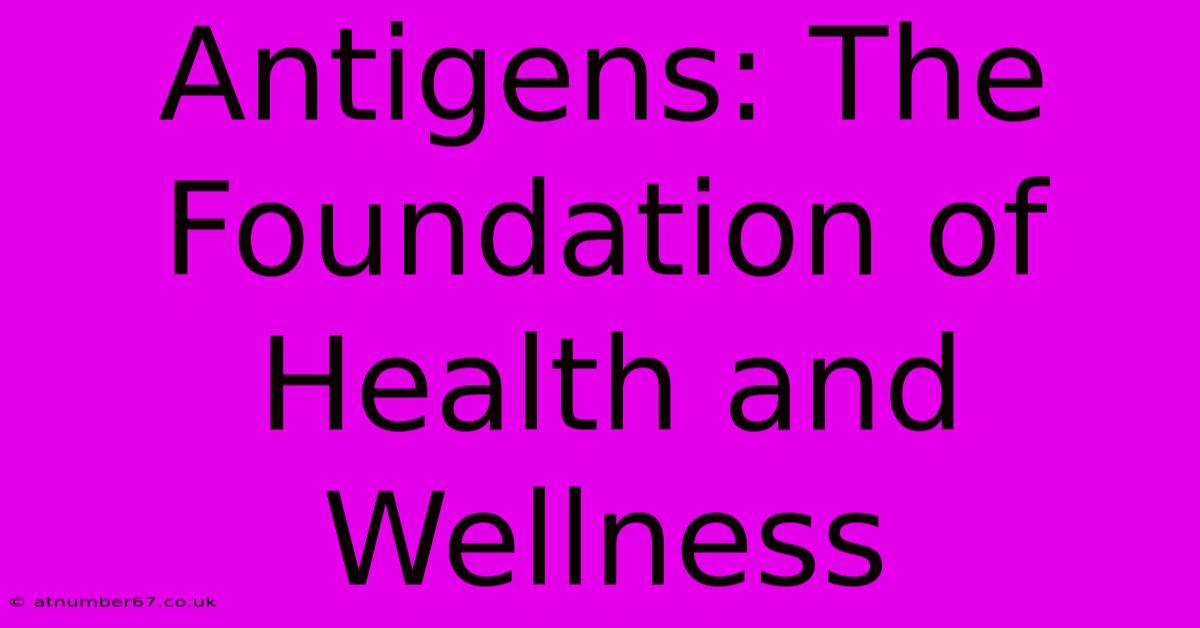Antigens: The Foundation Of Health And Wellness

Table of Contents
Antigens: The Foundation of Health and Wellness
Understanding antigens is crucial for grasping the complexities of our immune system and overall health. This article delves into the world of antigens, explaining their role in health and disease, and how they impact our well-being.
What are Antigens?
Antigens are substances that trigger an immune response in the body. They are typically proteins or polysaccharides found on the surface of pathogens (disease-causing organisms like bacteria, viruses, fungi, and parasites), but can also be found on other substances, such as pollen, toxins, or even transplanted organs. The immune system recognizes antigens as "foreign" and mounts a defense to neutralize or eliminate them. This recognition is a critical step in maintaining health and preventing illness.
Types of Antigens:
Antigens can be categorized in several ways:
- Exogenous Antigens: These originate from outside the body, entering through various routes like inhalation, ingestion, or injection. Examples include bacteria, viruses, and pollen.
- Endogenous Antigens: These are produced within the body's cells. They are often the result of cell damage or infection. Cancer cells, for example, express unique antigens.
- Autoantigens: These are self-antigens, meaning they are normally present in the body but are mistakenly targeted by the immune system. This misidentification is the basis of autoimmune diseases like rheumatoid arthritis and lupus.
How the Immune System Responds to Antigens
When an antigen enters the body, specialized immune cells, such as B cells and T cells, spring into action.
- B cells produce antibodies, which are Y-shaped proteins that bind specifically to antigens. This binding neutralizes the antigen, marking it for destruction by other immune cells.
- T cells directly attack infected cells or help coordinate other immune responses. Different types of T cells play distinct roles, including cytotoxic T cells (which kill infected cells) and helper T cells (which help activate other immune cells).
This intricate interplay of immune cells and antibodies creates a complex immune response designed to eliminate the antigen threat. The body's ability to efficiently identify and respond to antigens is crucial for preventing illness.
Antigens and Disease
The failure of the immune system to recognize or properly respond to antigens can lead to a variety of health problems:
- Infections: When the immune system fails to effectively combat an antigen from a pathogen, infection can occur. This can range from mild illnesses to severe, life-threatening conditions.
- Autoimmune Diseases: As mentioned earlier, these diseases arise when the immune system mistakenly attacks self-antigens.
- Allergies: Allergies are hypersensitivity reactions to certain antigens, such as pollen or food proteins. The immune system overreacts, causing symptoms like sneezing, itching, or swelling.
- Organ Transplant Rejection: The immune system recognizes transplanted organs as foreign and attempts to reject them. Immunosuppressant drugs are often used to prevent this rejection.
Maintaining a Strong Immune System
A strong immune system is key to effectively managing antigens and maintaining good health. Strategies to boost immunity include:
- Healthy Diet: Eating a balanced diet rich in fruits, vegetables, and whole grains provides essential nutrients for immune function.
- Regular Exercise: Physical activity helps to regulate the immune system and improve overall health.
- Adequate Sleep: Getting enough sleep is crucial for immune cell production and repair.
- Stress Management: Chronic stress can weaken the immune system. Practicing stress-reduction techniques is important.
- Vaccination: Vaccines introduce weakened or inactive forms of antigens to the body, stimulating an immune response and providing protection against future infections.
Conclusion
Antigens are fundamental to understanding health and illness. Their interaction with the immune system dictates whether we stay healthy or become sick. By understanding how antigens work and adopting healthy lifestyle choices, we can strengthen our immune systems and improve our overall well-being. Maintaining a robust immune response is essential for protecting ourselves from a range of diseases and enjoying optimal health.

Thank you for visiting our website wich cover about Antigens: The Foundation Of Health And Wellness. We hope the information provided has been useful to you. Feel free to contact us if you have any questions or need further assistance. See you next time and dont miss to bookmark.
Featured Posts
-
Speed Net Worth Debt Free Living Strategies
Apr 03, 2025
-
Lee Hyeris Net Worth Impact Of Her Acting Career
Apr 03, 2025
-
Kusah Age Discover Your Inner Strength
Apr 03, 2025
-
The Surprising Career Of John Mellencamps Daughter
Apr 03, 2025
-
Protecting The Innocent You Cant Take My Daughter
Apr 03, 2025
